The Ambassador of the European Union to Ukraine, Katarína Mathernová, sat down for an interview with Ukrinform literally a day after the most massive strike Russia launched on Ukraine since the full-scale invasion. Separately emphasizing the need to provide Ukraine with additional air defense systems, the ambassador also shared her opinion on allowing Ukraine to hit military targets inside Russia using Western weapons. The conversation naturally touched on Ukraine's progress on the path to joining the EU, the specifics of the negotiation process launched on June 25, and the fight against corruption. She also focused on diplomatic efforts to achieve a just peace and Ukraine's use of frozen Russian assets.
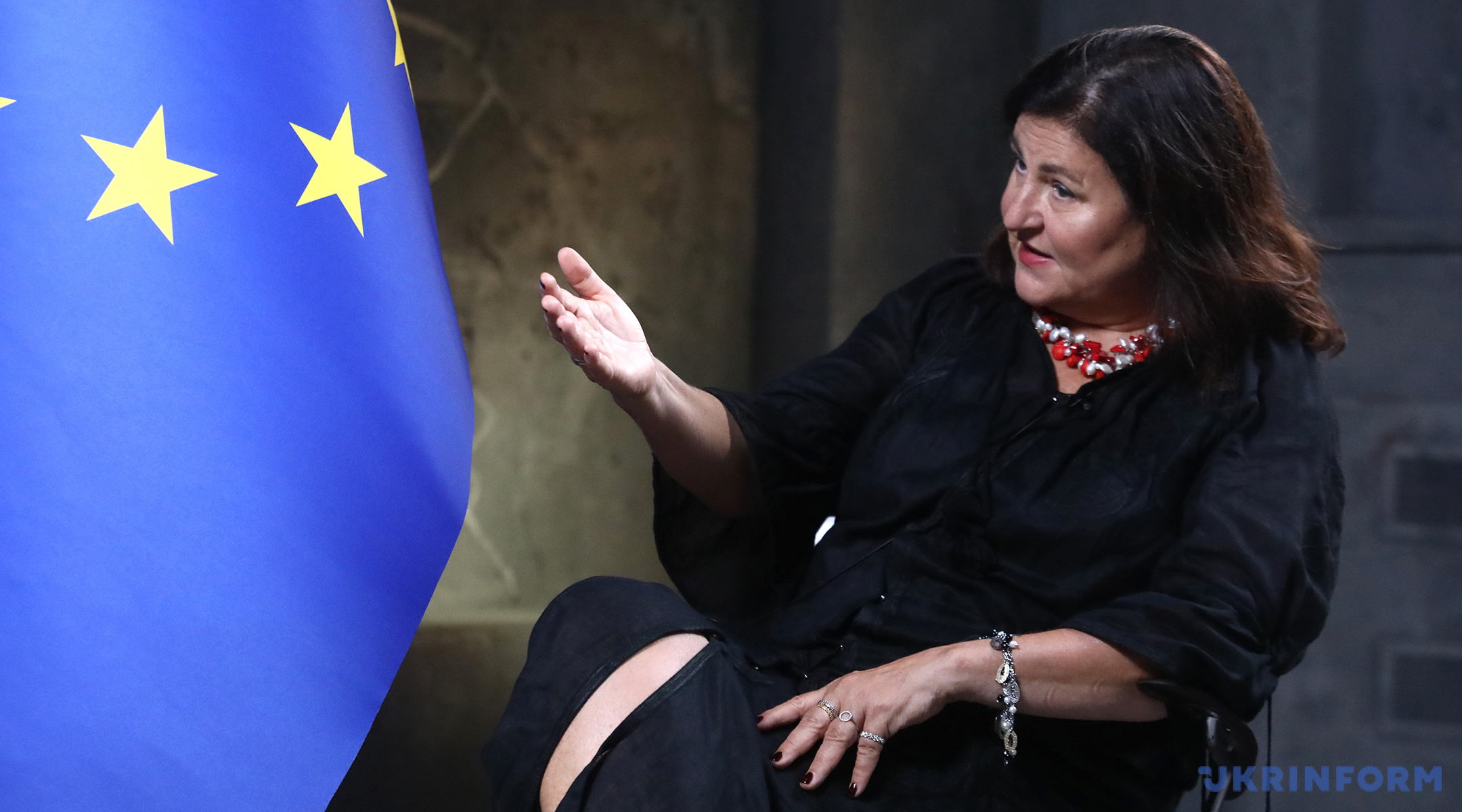
REMARKABLE THAT UKRAINE IS REFORMING WHILE DEFENDING ITSELF
- One of the topics of your recent meeting with Deputy Prime Minister, Minister for European and Euro-Atlantic Integration Olha Stefanishyna was the development of the government's institutional capabilities in the field of European integration, taking into account the increase in the volume of tasks that came with the start of negotiations. What exactly, in our opinion, should the Ukrainian government strengthen in this sense in order to fulfill these tasks?
- What is remarkable about Ukraine is that while it's defending itself in this terrible war, it is actually reforming and preparing itself for Euro-Atlantic integration. I know that getting ready for the Acquis Communautaire, a key body of law, is not very easy, and that the government has already made a lot of strides, as well as the Office of Deputy Prime Minister, with whom we have been working with for a number of years. Today I went to see some of the premises where they get together with experts and prepare for the various stages of the accession talks.
And I think this capacity needs to be further strengthened because the talks are very technical. For a country to absorb the full body of laws and norms of the EU is not an easy task. And I wouldn't say that there are specific areas of weaknesses. It's just the whole process, the whole machinery, and the teams need to be built up and strengthened over time.
- According to Ukraine officials, they aim to open the first cluster of accession negotiations in 2025. Now Brussels is waiting to get from Ukraine the two roadmaps - on the reform of public administration and reform in the area of the rule of law. When should they be provided? And what criteria would be used to evaluate them?
- What we have done is on the 25th of June, negotiations started, which, was really an important moment, and shortly after that was the first so-called screening of Ukrainian legislation, whether it is in line with the EU Acquis. It started with public procurement and now in September we will continue exactly with rule of law, basic norms, public administration, as well as economic norms. And the two road maps will be based on the recommendation that will result from the screening process of these chapters. So what the teams are doing right now, also, with the help of several European Union experts, is preparing for the screening, identifying the areas in Ukrainian legislation and institutional practice, comparing it to the norms that are required by the European Union. And on the basis of that there will be the recommendations for the action plans.
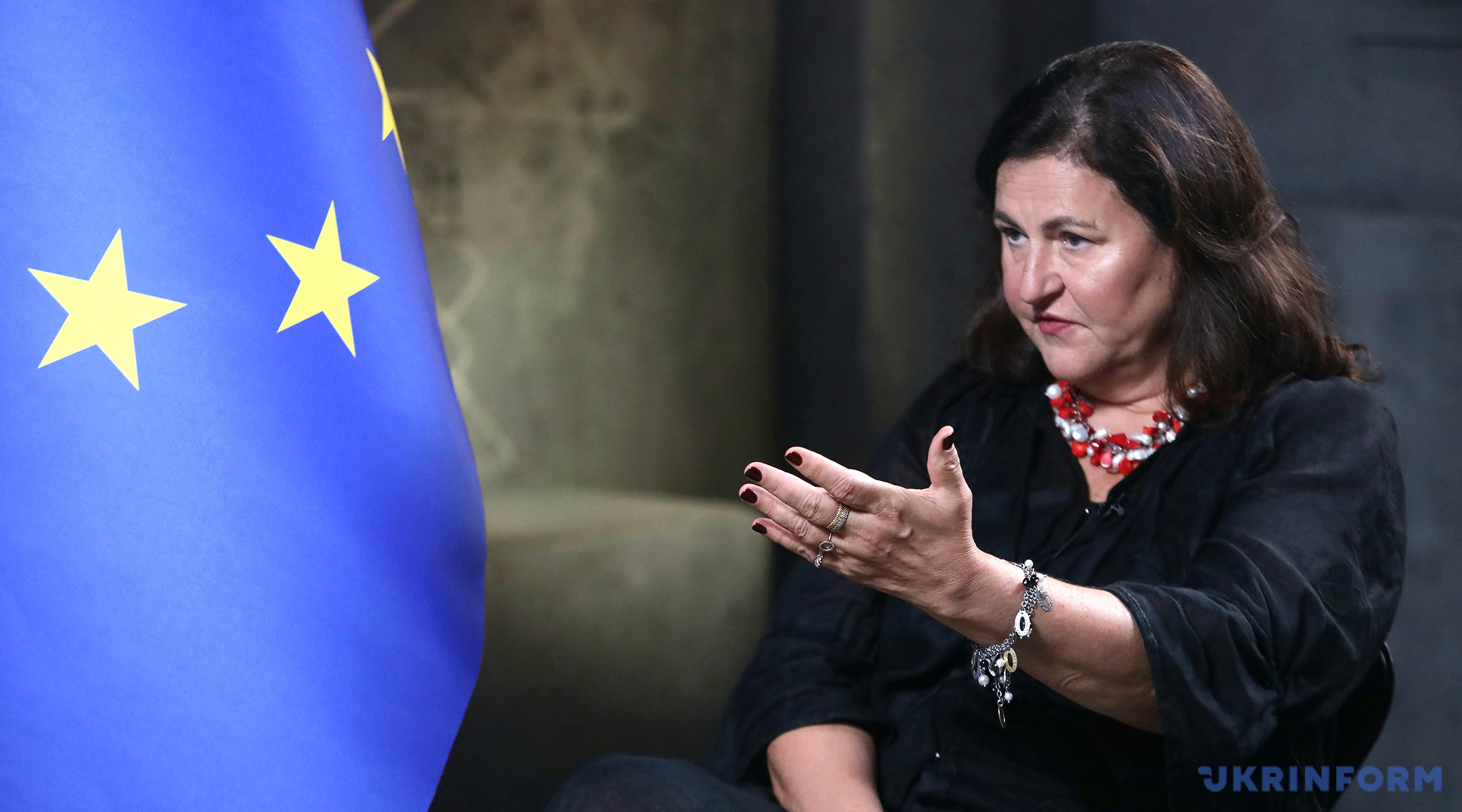
EU SUPPORTS MOVE TO CREATE POSTS OF EU INTEGRATION DEPUTIES IN REGIONS
- Recently, we heard about the creation of a new position of deputy chiefs for European integration in regional military administrations. How does this correspond to European practices? How effective do you think these officials could be in bringing Ukraine closer to the EU?
- Becoming part of the EU is a whole society effort and, in that sense, it's really important to have an understanding of how the EU functions at all levels of government. And once you’re in the EU, the regional and local level will be an important partner to similar entities in other member states.
The regional and urban policy is one of the strong features of EU policies. So I think it's never too early to start that process. I don't think they are going to play a specific role in the actual accession talks but familiarizing and being a partner that is capable of bringing the EU to the regional and local level and to be able to use funds at this level is important. So we welcome this. But this is not something that the EU prescribes because it's up to each individual country to organize itself internally. We will be supporting this with training and peer-to-peer learning.
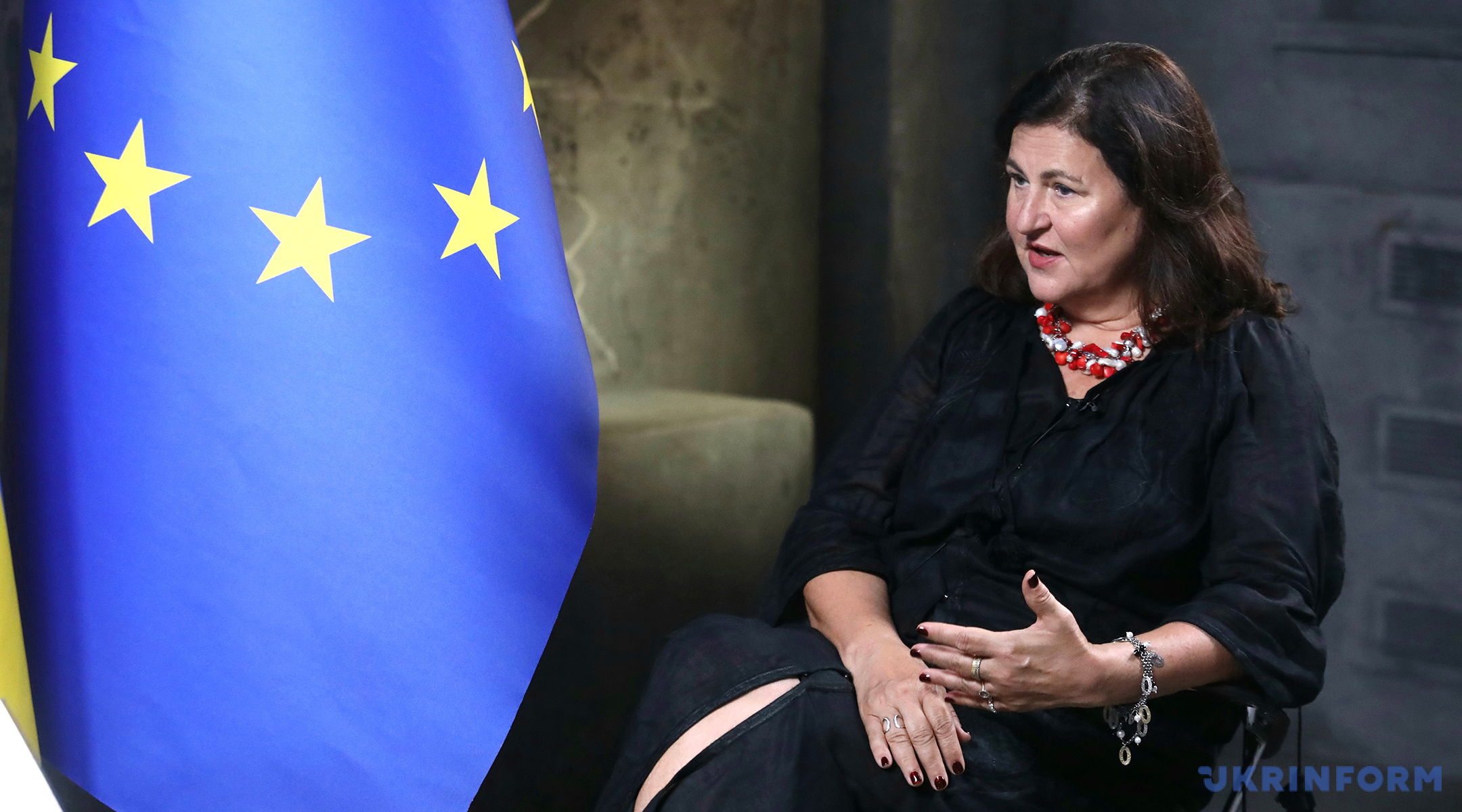
FIGHT AGAINST CORRUPTION IS AN IMPORTANT PART OF EU INTEGRATION
- Corruption and anti-corruption efforts – a very sensitive topic for Ukraine and for the EU officials that are closely watching. Recently we witnessed the illegal enrichment charges being pressed against the head of the anti-monopoly body, we saw the deputy energy minister being detained on bribe charges. How does the EU see these developments? As an illustration of further widespread corruption in Ukraine or as an ongoing campaign aimed at graft purge?
- Well, I would certainly lean towards the latter option. I'm not saying there is no corruption in Ukraine, but over the last 10 years Ukraine has made huge efforts to eradicate corruption by closing space for corruption by building institutions, by adopting a number of laws, by making public officials file very intrusive asset declarations. And the reason I mention this is because even institutions such as Transparency International have tracked progress of Ukraine, and over the last 10 years from 2013 to 2023, Ukraine leaped by 40 spaces in the corruption perception list. It was at 144th spot out of 180, and now it's 104th. So there has been very, very palpable and significant progress but obviously, with corruption you can never be done forever.
So you have built the three independent institutions, there are our key partners, whether it's the prosecutor’s office, the investigation or prevention of corruption, and the High Anti-corruption Court. Always, when I meet with the heads of these institutions, I tell them that it's extremely important that they keep the integrity of their institutions and make sure they're able to discharge their tasks because an effective anti-corruption fight is an important part of European integration and that there cannot be a shadow of doubt about these institutions because they are such important building blocks for fighting corruption.
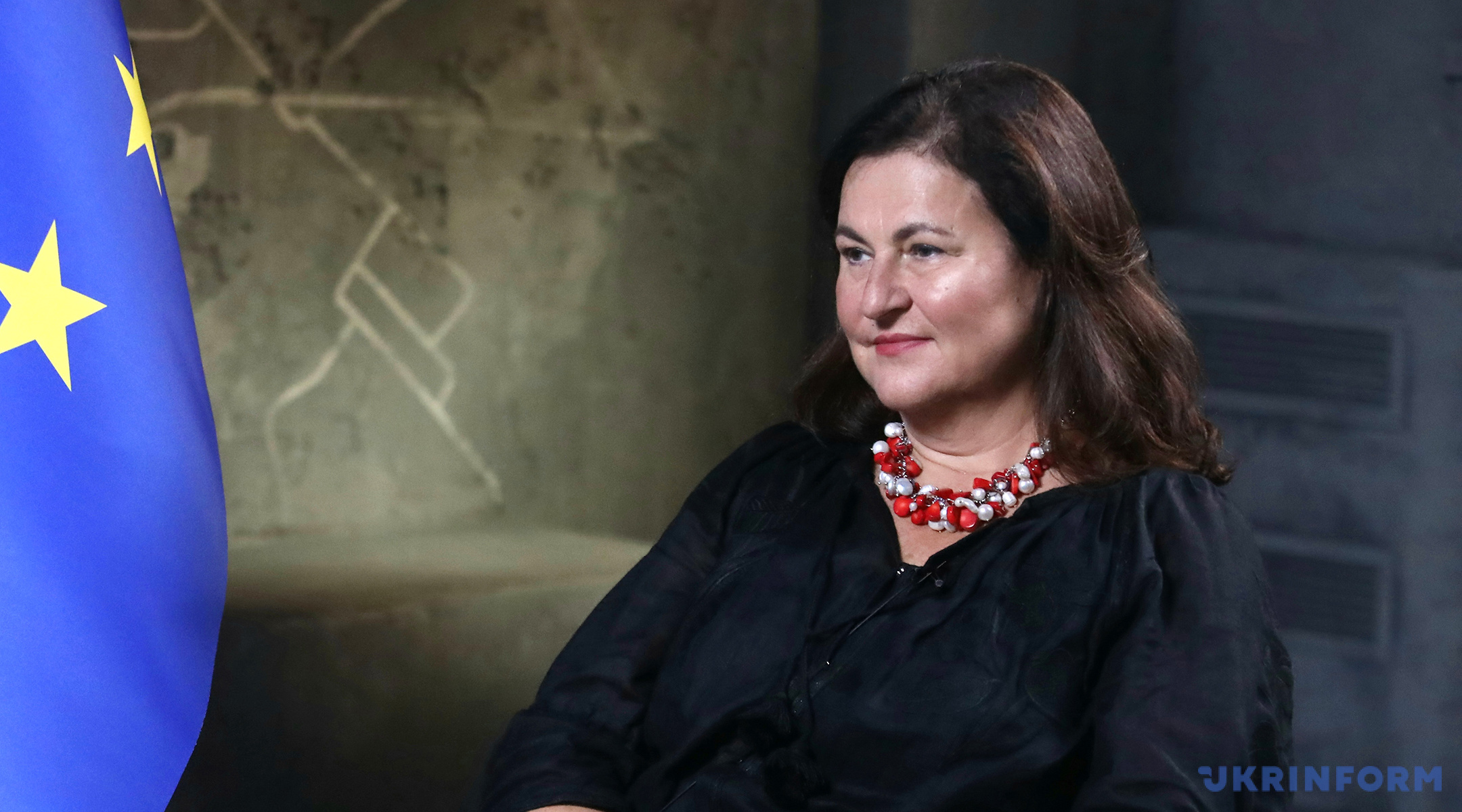
- While a country struggles to sustain its budget, we understand that the mechanism of using frozen Russian assets is very important. On June 13, G7 leaders agreed on a $50 billion loan by for Ukraine using frozen Russian assets, but the actual mechanism to be used for Ukraine to actually receive these funds remains unclear. When can we expect it to be drawn up?
- There are two aspects to the answer. One is that the G7 mechanism for the $50 billion loan that will be backed by the proceeds from assets is being worked on, I think these are the very final stages of developing the actual mechanism. But it’s important to remember that the European Union, before the G7 process was agreed, actually took action and sequestered the assets because a major part of these assets are actually in the European Union – in fact, in Belgium, in a company called Euroclear. And we have received the first transfer in the amount of EUR 1.5 billion this July, and all of the money is destined to go to Ukraine.
It's going to go to purchase weapons through several member states, also ammunition, it's going to come to Ukraine, to cover the purchase of weapons in Ukraine, thus eliminating the transport and logistic costs. Also, a portion of it goes to the winter preparedness on energy.
So the EUR 1.5 billion is already happening, it's being contracted, and will be coming to Ukraine in terms of support of direct procurement of weaponry very, very soon. So that is a separate track that happened before the G7 agreement. In the future, proceeds will be folded into this $50 billion loan whose mechanics are being finalized.
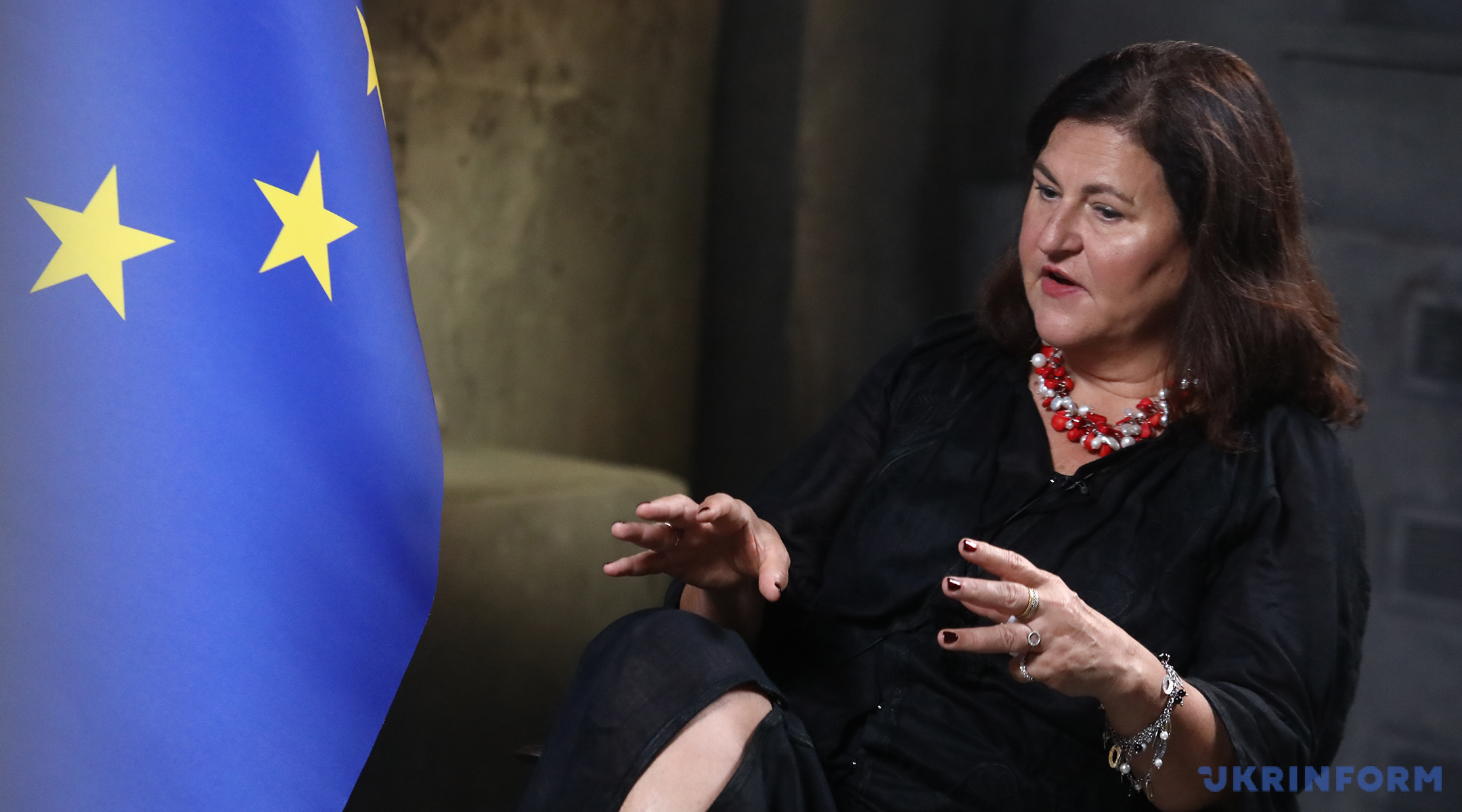
NO ONE DICTATES UKRAINE HOW A JUST PEACE SHOULD LOOK LIKE
- Let’s speak of the diplomatic track of achieving peace in Ukraine. What is your vision of the second Peace Summit? Do you believe Russia should be present at the event given their obvious disregard of the principles of international law? And is the EU exploring options to help ensure support for Ukraine in the conditional “Global South”?
- I'll get to the Global South right away. From the very beginning of President Zelensky’s Peace Formula we have really redoubled our efforts to reach out and engage with these countries, including together with the Ukrainian diplomats if there is an embassy in a certain country. So there has been really a very strong diplomatic activity. We have been very supportive of the stance in the European nations’ formations. So we have been actively supporting the Ukrainian outreach. A huge amount of diplomatic skill and energy has been put into reaching out to the Global South. Look at the Peace conference in Switzerland. It had close to 100 nations plus international organizations present. So I think this was an important message of support for international law and backing the Ukrainian stance.
Whether Russia will be at the second Peace Summit will be very much determined by Ukraine. Nobody is dictating to Ukraine what the just peace should look like. And I think it's going to also be reflective of what is happening on the battlefield, whether it’s on the territory of Russia or in the Ukrainian East. I'm just reiterating that I hope that the alliances that you are relying on are indeed bringing the support timely to Ukraine to strengthen its position for any future negotiations.
WESTERN PARTNERS SHOULD ALLOW UKRAINE TO DEFEND EFFECTIVELY
- Apparently, our defense forces are working on strengthening Ukraine’s negotiation position ahead of the potential talks but also, apparently, we still have a pressing problem with the strikes that keep coming from the Russian territory. What is your take on allowing Ukraine to hit military targets deep inside Russia using weapons supplied by Western partners given the current edge that Russia enjoys to this end?
- I recently came back here after some weeks away and we were celebrating on Saturday the 33rd anniversary of Independence and yesterday, unfortunately, we witnessed the largest attack by Russia since the beginning of the full-scale invasion. They pummeled, again, the energy infrastructure, houses, they killed people. So I really think that it's time for all of us to hunker down and help Ukraine protect itself with more air defense and ability to withstand the terrible, terrible attacks.
As to your question, I can only reiterate the words of my boss, High Representative Josep Borrell, who has very openly called for lifting the restrictions on long-range missiles because Ukraine should be allowed to defend itself effectively and in line with International law. So I can only agree with my boss on this.
- Great to hear that you're in the same line with your boss.
Ievgen Matiushenko, Kyiv
Photo: Volodymyr Tarasov
